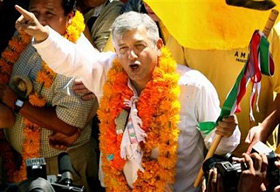 |
 |
 |
 Editorials | Opinions | April 2006 Editorials | Opinions | April 2006  
A New Deal from the 'Mexican Messiah'
 Alan Freeman - theglobeandmail.com Alan Freeman - theglobeandmail.com


| | Mexican leftist presidential front-runner Andres Manuel Lopez Obrador. (Daniel Aguilar/Reuters) |
Huachinango, Mexico - Filogonio Gaspar Rios is a small man with weathered skin, a Pancho Villa mustache and a straw hat. And he loves Andres Manuel Lopez Obrador, the Mexican presidential candidate known by his initials AMLO.

"I'm a campesino. I travelled with 100 other campesinos for 2½ hours to see him," Mr. Rios explained. "We're all extremely poor peasants, but we like AMLO's project. . . . He is a campesino like us."

Mr. Rios has joined a large crowd in the central plaza of this hill town in the state of Puebla, 200 kilometres from Mexico City, to see the man who says he will deliver Mexico's struggling millions out of poverty.

When he climbs out of an SUV, the 52-year-old candidate for the left-of-centre PRD party is thronged by the enthusiastic crowd who shout his name and reach out to touch him. Dressed in a traditional guayabera, the long white shirt popular in Latin America, his head and neck topped with garlands of white and yellow flowers, Mr. Lopez Obrador looks like a cross between a 1960s guru and a Roman emperor.

Mr. Lopez Obrador, who rose to prominence as Mexico City's activist mayor, is leading the pack (although his lead is shrinking) in the race to replace Vicente Fox as Mexican president in the July 2 vote.

"We need a transformation, a purification of our public life so that there is no longer so much poverty and so much marginalization," Mr. Lopez Obrador told the crowd. "Mexico belongs to everybody, not just to the few."

He laid out the three principles he says are the basis of his political life: "Do not lie. Do not rob. Do not betray the people."

In a country where half the population survives on less than $10 (U.S.) a day and where corruption is endemic in public life, that type of talk resonates with many voters.

He then mapped out an ambitious program for reform, including enriched pensions for the elderly, payments for the disabled, expanded health care and a massive investment in schools and universities.

He also promised to protect peasants such as Mr. Rios by guaranteeing prices for their crops and stopping tariff-free imports of corn from the United States that are to be phased in by 2008 under the North America free-trade agreement.

"We have to protect our producers from the invasion of foreign products," he said. "You cannot have a rich government with a poor population."

Concerned that his economic plans were being misunderstood by the business community, many of whom are worried that he is too far to the left, Mr. Lopez Obrador has recently begun meeting top executives of leading Mexican companies such as Cemex SA to reassure them.

His chief economic adviser, Rogelio Ramirez de la O, said Mr. Lopez Obrador plans to finance billions of dollars in spending on infrastructure, social programs and investment in the oil industry through spending cuts and better tax collection rather than extra borrowing.

Mr. Lopez Obrador himself is famous for his austerity. A widower, he lives in a modest apartment in Mexico City and, as mayor, drove around in a Tsuru, a basic Nissan. He insists on flying commercial class during his campaign, even when, as on this day, a delayed flight forces him to miss two campaign events.

If elected, Mr. Lopez Obrador has promised to vacate Los Pinos, the presidential palace in Mexico City and turn it into a museum.

George Grayson, a political scientist at the College of William & Mary in Virginia and author of Mexican Messiah, a newly published biography of Mr. Lopez Obrador, said he may be a populist, but he also has some troubling traits.

"He's authoritarian. He's secretive. He's messianic, not one who listens to advice from other people. . . . When he's criticized, it's always a conspiracy. He's never wrong. . . ."

As Mexico City's mayor, he got kudos for introducing a small pension to all residents over age 70 and for his high-profile public-works projects, including construction of a second deck of an expressway in the southern part of the city.

It was a typical Lopez Obrador project, Mr. Grayson said. Extending the subway would probably have done more to reduce congestion but that would have taken years and, by definition, would have been out of sight.

Daniel Lund, a U.S.-born market researcher and onetime academic who has lived in Mexico for 30 years, said Mr. Lopez Obrador appeals to Mexico's lower middle class, which has been deeply disappointed by Mr. Fox's failed promises of reform and prosperity.

Mr. Lund denies that Mr. Lopez Obrador is a socialist or a Latin American radical. "He symbolizes opportunity and the possibility that you can have social mobility," he said. "He's closer to FDR [New Deal U.S. President Franklin Delano Roosevelt]."

Federico Esteves, a political scientist at ITAM, a Mexico City university, insists that Mr. Lopez Obrador is a leftist as far as Mexican politics are concerned but says he can work with business, adding, "I don't think he's a disaster coming."

But Mr. Esteves questions Mr. Lopez Obrador's ability to represent Mexico on the world stage. "He came out of the swamps in Tabasco and never left Mexico. He's something of a country bumpkin. He knows the country but he doesn't know the world. He doesn't know the 21st century. He's never been there." | 
 | |
 |



